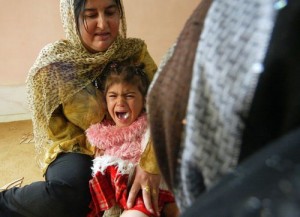
(AFP File Photo)
Two sentences in a case related to female genital mutilation (FGM) in seven years since passing a law that criminalises the practise in Egypt is not enough, Human Rights Watch (HRW) said in a report Monday.
The international watchdog called on the Egyptian authorities to “investigate and prosecute those who carry out the procedure.”
A misdemeanour court handed a doctor two years imprisonment and an EGP 500 fine over a botched FGM procedure that left a young girl dead. The girl’s father, who commissioned the procedure, received a suspended verdict of three months in prison.
The girl, 13-year-old Sohair Al-Batea, passed away during an FGM operation in June 2013 from an anaesthetic overdose. The cause of death was recorded by a forensic medicine authority report at a clinic located in the rural town of Aga, in Daqahleya.
Monday’s verdict reverses an earlier verdict issued in November 2014 by the same court, in which charges against the doctor had been dismissed. The prosecution, along with the National Population Council, had appealed the acquittal.
Azza Kamel, women’s rights activist and coordinator of Fouada Watch organisation for women’s rights, praised the verdict as it is the first time doctors and parents are penalised for such a procedure.
Articles 241 and 242 of Egypt’s penal code have criminalised any act of FGM since June 2008, stipulating the sentencing of those who carry out the procedure to between three months and two years in prison, or a fine between EGP 1,000 and EGP 5,000.
Kamel also commended the move by the prosecution to appeal against the acquittal, although she was hoping for a tougher penalty that includes eliminating the doctor from syndicate records.
She added that the court verdict is a “good step”, as it will provide a deterrent to families and doctors against FGM.
At least 90% of Egyptian women between the ages of 15-49 have undergone FGM, according to the 2008 Demographic and Health Survey. The practice is also common in other African and Middle Eastern countries. The World Health Organization estimates that between 100 million and 140 million women have been victims of genital mutilation worldwide.
HRW’s report acknowledged governmental awareness efforts. However, it highlighted the need for a “comprehensive national strategy to end FGM that includes religious and community leaders, healthcare professionals, teachers, and civil society.”
“Unless the law is rigorously applied, there will be more Sohairs,” the report concluded.



